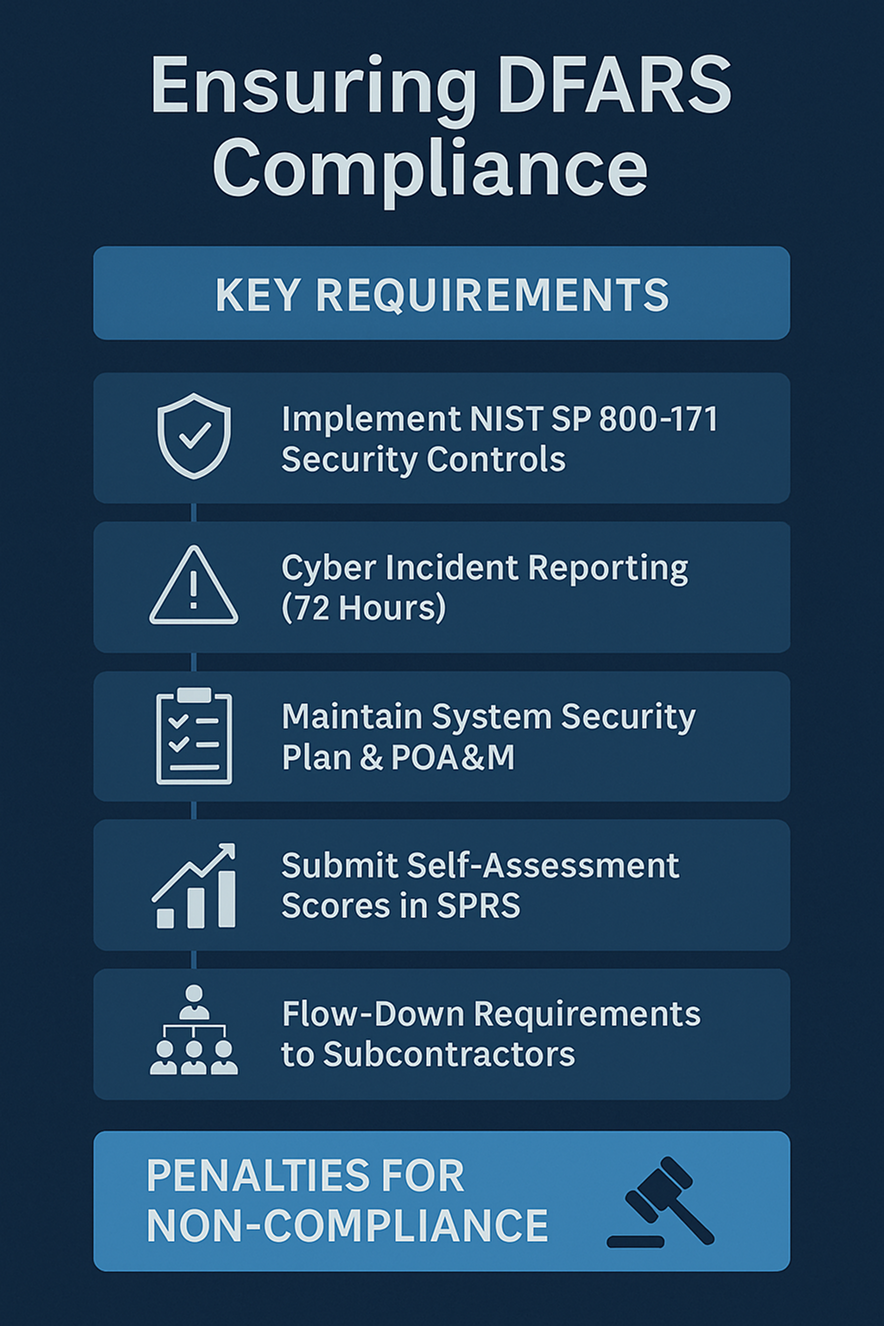DFARS Compliance
Ensuring Cybersecurity and Regulatory Adherence in Defense Contracting
Defense Federal Acquisition Regulation Supplement (DFARS) is a set of cybersecurity regulations that apply to all contractors and subcontractors working with the U.S. Department of Defense (DoD). DFARS is designed to protect Controlled Unclassified Information (CUI) in non-federal systems and networks, with specific security mandates based on NIST SP 800-171.
Compliance with DFARS is a contractual obligation. Organizations that fail to meet these requirements risk losing eligibility for DoD contracts, facing penalties, or being debarred from future federal opportunities.
DFARS compliance is mandatory for:
- Prime contractors and subcontractors engaged in DoD contracts.
- Organizations handling Controlled Unclassified Information (CUI).
- Vendors and service providers in the defense industrial base (DIB), including IT, engineering, and manufacturing sectors.
1. Implement NIST SP 800-171 Security Controls
Contractors must implement all 110 security requirements from NIST SP 800-171, as mandated under DFARS 252.204-7012(b)(2). These controls protect CUI confidentiality in non-federal information systems.
2. Cyber Incident Reporting (within 72 Hours)
Per DFARS 252.204-7012(c), contractors must report cyber incidents to the DoD within 72 hours via the DoD DIBNet portal and preserve all evidence of the incident for forensic review.
3. Maintain System Security Plan (SSP) and POA&M
Under DFARS 252.204-7012(b)(3), contractors must document their current cybersecurity posture through an SSP and maintain a Plan of Action and Milestones (POA&M) for any control gaps.
4. Submit Compliance Scores to SPRS
As specified in DFARS 252.204-7019, contractors are required to submit their NIST SP 800-171 self-assessment score to the Supplier Performance Risk System (SPRS).
5. Flow-Down Requirements to Subcontractors
DFARS 252.204-7012(m) requires prime contractors to ensure subcontractors who process CUI also meet DFARS and NIST SP 800-171 requirements, and that clauses are properly included in all subcontracts.

Non-compliance with DFARS requirements can lead to significant consequences, including:
- Contract Termination: The DoD may terminate contracts for default if compliance is not achieved.
- Suspension of Payments: Payments may be withheld until compliance issues are resolved.
- Legal Liabilities: Non-compliance can result in legal actions, including civil penalties and damages under the False Claims Act.
- Debarment: Organizations may be suspended or debarred from future government contracts.
- Reputational Damage: Non-compliance can harm an organization's reputation, affecting future business opportunities.
Resecurity delivers tailored solutions to help contractors meet DFARS and NIST SP 800-171 obligations through a combination of security operations, risk management, and compliance automation.
NIST 800-171 Gap Assessment
- Identify control deficiencies across 14 families
- Develop actionable remediation roadmaps
SSP and POA&M Development
- Build compliant and auditable documentation
- Maintain plans for ongoing maturity and updates
Incident Response and 72-Hour Reporting
- Implement response workflows
- Enable timely and accurate breach reporting to DoD
SPRS Score Preparation and Submission
- Conduct required scoring methodology
- Generate SPRS-ready compliance summaries
Third-Party Compliance Monitoring
- Manage subcontractor DFARS obligations
- Automate flow-down clause validation
DFARS compliance is no longer optional for defense suppliers. By working with Resecurity, your organization gains the tools and support needed to meet DoD cybersecurity expectations, safeguard CUI, and remain competitive in government contracting.
Contact Resecurity to schedule a DFARS readiness consultation or learn more about securing your information systems under DoD regulations.

Los Angeles, CA 90071 Google Maps

